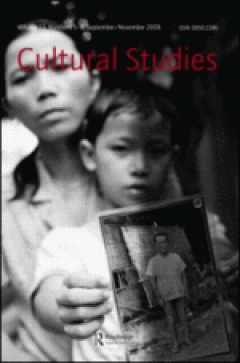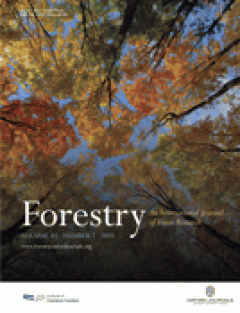Filter by

HIGHER EDUCATION 'REFORM', HEGEMONY, AND NEO-COLD WAR IDEOLOGY: Lessons from …
Examining some of the specifics of educational 'reform' in the post-state socialist political landscape, this article argues that the reproduction of Western hegemony in Eastern Europe and within the academic global political economy is more complex than we can grasp through idealist critiques of travelling theory and of representations alone. We need to attend to the materiality of hegemony, i…
- Edition
- Volume 23, Issue 5 & 6 September 2009 , pages 720
- ISBN/ISSN
- 09502386
- Collation
- -
- Series Title
- Cultural Studies
- Call Number
- -

INTERPRETING TRANSNATIONAL CULTURAL PRACTICES: Social discourses on a Korean …
This article explores the ways in which East Asian countries approach and understand the transnational flows of Korean cultural products. Specifically, it examines newspaper discourses from Korea, Japan, Hong Kong, and China concerning the high popularity of a transnationalized Korean drama, Dae Jang-geum, across those societies. By adopting a quantitative and qualitative discourse analysis, th…
- Edition
- Volume 23, Issue 5 & 6 September 2009 , pages 736
- ISBN/ISSN
- 09502386
- Collation
- -
- Series Title
- Cultural Studies
- Call Number
- -

NEGOTIATING A COMMON TRANSNATIONAL SPACE: Mapping performance in Jamaican Dan…
At the interstices of cultural geography and performance studies, this article continues the author's earlier research and writing on Jamaica's Dancehall culture, and analyzes the applicability of insights gained to other black performance genres, most notably South African Kwaito. Through research methods including interviews and participant observation, a comparative perspective on Dancehall …
- Edition
- Volume 23, Issue 5 & 6 September 2009 , pages 756
- ISBN/ISSN
- 09502386
- Collation
- -
- Series Title
- Cultural Studies
- Call Number
- -

BEYOND ETHNICITY, INTO EQUALITY: Re-thinking hybridity and transnationalism i…
- Edition
- Volume 23, Issue 5 & 6 September 2009 , pages 775
- ISBN/ISSN
- 09502386
- Collation
- -
- Series Title
- Cultural Studies
- Call Number
- -
- Edition
- Volume 23, Issue 5 & 6 September 2009 , pages 775
- ISBN/ISSN
- 09502386
- Collation
- -
- Series Title
- Cultural Studies
- Call Number
- -

TRANSLATING THE TRANSNATIONAL: Teaching the 'Other' in translation
This article is concerned with the uneven landscape of cultural flows across the global south and north. By examining geo-political hierarchies in the production of knowledge through translation and teaching, the article raises questions about the shortcomings of the term, 'transnational' as it is employed in post-colonial and cultural studies today. Reception of Middle Eastern cultural texts w…
- Edition
- Volume 23, Issue 5 & 6 September 2009 , pages 795
- ISBN/ISSN
- 09502386
- Collation
- -
- Series Title
- Cultural Studies
- Call Number
- -

TRANSGEOGRAPHICAL PRACTICES OF MARRONAGE IN SOME AFRICAN FILMS: Peck, Sissako…
In this article, I mobilize the notion of 'marronage' to analyze the ways in which specific practices of representation allow us to observe transgeographical practices of expression in the films of Raoul Peck, Abderrahmane Sissako, and Jean-Marie Teacuteno. I suggest that the works of these three filmmakers are not relational and do not attempt to recuperate colonial and imperial experience in …
- Edition
- Volume 23, Issue 5 & 6 September 2009 , pages 810
- ISBN/ISSN
- 09502386
- Collation
- -
- Series Title
- Cultural Studies
- Call Number
- -

FROM CULTURAL STUDIES TO TUDES CULTURELLES, TUDES DE LA CULTURE, AND SCIENC…
The starting point of our reflexion about the place of Cultural Studies in France and the development of French Cultural Studies lies in a double paradox. The first paradox consists in the absence of any stable terminology and taxonomy, whereas Cultural Studies has already, though implicitly - almost secretly, encroached on the French scientific realm in the shape of very plastic and dynamic fo…
- Edition
- Volume 23, Issue 5 & 6 September 2009 , pages 831
- ISBN/ISSN
- 09502386
- Collation
- -
- Series Title
- Cultural Studies
- Call Number
- -

'A ROOM OF ONE'S OWN'?: Cultural Studies' relationship to institutionalizatio…
The phrase, 'a room of one's own,' coined by Virginia Woolf, refers not only to the physical space necessary for creating art but also to the hitherto ungranted space within the canon for women artists. In an attempt to relate to the dilemma posed by Woolf, my aim in this paper is to assess whether, as a physical site, the Spanish University (its departments and curricula) provides the intellec…
- Edition
- Volume 23, Issue 5 & 6 September 2009 , pages 855
- ISBN/ISSN
- 09502386
- Collation
- -
- Series Title
- Cultural Studies
- Call Number
- -

POLITICAL ONTOLOGY: Cultural Studies without 'cultures'?
In this article I seek to put into conversation two different but convergent intellectual/political projects, Lawrence Grossberg's 'radically contextualist cultural studies' and 'political ontology', an emergent analytical framework being developed by a loosely connected network of scholars. Central to both projects is the question of modernity, but while Grossberg's cultural studies focuses on…
- Edition
- Volume 23, Issue 5 & 6 September 2009 , pages 873
- ISBN/ISSN
- 09502386
- Collation
- -
- Series Title
- Cultural Studies
- Call Number
- -

Deadwood abundance in recently harvested and old Nova Scotia hardwood forests
Deadwood (dead standing tree (snag), woody debris (WD; downed deadwood), buried wood and stump abundance) was estimated in northern hardwood forests of Nova Scotia dominated by Acer saccharum, Betula alleghaniensis, Fagus grandifolia, Betula papyrifera and Acer rubum. Three strata were examined (1) old forests, (2) forests clearcut 1�2 years before measurement and (3) forests clearcut 8 years b…
- Edition
- Volume 83, Number 2, April 2010. Pp. 219-227
- ISBN/ISSN
- 0015752x
- Collation
- -
- Series Title
- Forestry an International Journal of Forest Research
- Call Number
- -

Problems as Building Blocks for Organizational Learning: A Roadmap for Experi…
This article explores the practice of problem-based learning (PBL) in organizational contexts and its contribution to organizational learning. It proposes a learning that is context dependent based on the collective participation of individuals through structured and spontaneous processes. A theory-elaboration approach was adopted by means of an interpretivist methodological paradigm. Rich data…
- Edition
- Vol. 35, No. 3, June 2010. pp. 243-275
- ISBN/ISSN
- 10596011
- Collation
- -
- Series Title
- Group & Organization Management
- Call Number
- -

Learning Task Effectiveness and Social Interdependence Through the Mediating …
This study proposes a model by postulating antecedents and mediators related to interemployee linkages as the key drivers of task effectiveness, in which task effectiveness is affected indirectly by expressiveness, outcome, and task interdependence through the mediation of knowledge sharing and interemployee helping. This study conducts empirical testing of the proposed model by investigating o…
- Edition
- Vol. 35, No. 3, June 2010. pp. 299-328
- ISBN/ISSN
- 10596011
- Collation
- -
- Series Title
- Group & Organization Management
- Call Number
- -

Associations of Culture and Personality With McClelland’s Motives: A Cross-…
Using a cross-cultural sample of 17,538 managers from 24 countries, this study explores the interrelationships between McClelland�s motives and specific aggregate-level cultural dimensions and personality factors. The results reveal significant relationships between the Achievement, Affiliation, and Power Motives, and the cultural dimensions of Performance Orientation, Humane Orientation, and P…
- Edition
- Vol. 35, No. 3, June 2010. pp. 329-367
- ISBN/ISSN
- 10596011
- Collation
- -
- Series Title
- Group & Organization Management
- Call Number
- -

Identity Without Boundaries: Public Administration’s Canon(s) of Integration
It is often charged that the study of public administration lacks boundaries and suffers from an identity crisis. This charge is grounded in a positivist belief in the unity of knowledge. From the perspective of positivists, the study of public administration lacks the epistemological unity that would make it a true science. Regarding public administration as an interdisciplinary study and prac…
- Edition
- Vol. 42, No. 2, April 2010. pp. 131-159
- ISBN/ISSN
- 00953997
- Collation
- -
- Series Title
- Administration & Society
- Call Number
- -

Alignment and Results: Testing the Interaction Effects of Strategy, Structure…
Theory and evidence has grown on the role of strategy in public organizations. Miles and Snow suggest that strategy�s impact on organizational success will be greatest when external and internal factors are in alignment�when, for instance, managerial prospectors in decentralized organizations operate in a turbulent environment. This study examines three of the Miles and Snow factors�strategy, s…
- Edition
- Vol. 42, No. 2, April 2010. pp. 160-192
- ISBN/ISSN
- 00953997
- Collation
- -
- Series Title
- Administration & Society
- Call Number
- -

Trust in Governance Networks: Its Impacts on Outcomes
Governance networks are characterized by complex interaction and decision making, and much uncertainty. Surprisingly, there is very little research on the impact of trust in achieving results in governance networks. This article asks two questions: (a) Does trust influence the outcomes of environmental projects? and (b) Does active network management improve the level of trust in networks? The …
- Edition
- Vol. 42, No. 2, April 2010. pp. 193-221
- ISBN/ISSN
- 00953997
- Collation
- -
- Series Title
- Administration & Society
- Call Number
- -

Examining Intergovernmental and Interorganizational Response to Catastrophic …
This research focused on the interorganizational and intergovernmental response to Hurricanes Katrina and Rita in 2005. The study used the concepts from the network and partnerships literature and used current techniques of network analysis. The study found that the use of intergovernmental and interorganizational response to coordinate complex operations in multiorganizational environments of …
- Edition
- Vol. 42, No. 2, April 2010. pp. 222-247
- ISBN/ISSN
- 00953997
- Collation
- -
- Series Title
- Administration & Society
- Call Number
- -

Four Challenges to Accountability in Contemporary Public Administration: Less…
Using the Romzek�Dubnick typology of accountability, the authors analyze challenges that reinvention and new public management reforms in the United States and China present with regard to maintaining legal controls, protecting non-mission-based administrative objectives, pursuing public values, and sustaining hierarchical authority. The authors show that reforms�especially outsourcing and resu…
- Edition
- Vol. 42, No. 1 Suppl, April 2010. pp. 11S-33S
- ISBN/ISSN
- 00953997
- Collation
- -
- Series Title
- Administration & Society
- Call Number
- -

Future Prospects for Performance Management in Chinese City Governments
Contrasting views are presented on the nature and rationale for public management reforms in China. One school argues that they are strongly influenced by international practice, whereas the other holds that they reflect the characteristics of Chinese politics and administration. The authors explore this proposition in the arena of performance management, where they pay particular attention to …
- Edition
- Vol. 42, No. 1 Suppl, April 2010. pp. 34S-55S
- ISBN/ISSN
- 00953997
- Collation
- -
- Series Title
- Administration & Society
- Call Number
- -

Hitting the Target but Missing the Point: The Rise of Non-Mission-Based Targe…
A striking feature of the performance measurement system in Chinese local governments is the emphasis on non-mission-based targets. Drawing on data collected in a 5-year field research project in one inland Chinese county, this article examines the causes, dynamics, and consequences of the rise of non-mission-based targets in local China. It argues that non-mission-based targets are largely an …
- Edition
- Vol. 42, No. 1 Suppl, April 2010. pp. 56S-76S
- ISBN/ISSN
- 00953997
- Collation
- -
- Series Title
- Administration & Society
- Call Number
- -
 Computer Science, Information & General Works
Computer Science, Information & General Works  Philosophy & Psychology
Philosophy & Psychology  Religion
Religion  Social Sciences
Social Sciences  Language
Language  Pure Science
Pure Science  Applied Sciences
Applied Sciences  Art & Recreation
Art & Recreation  Literature
Literature  History & Geography
History & Geography